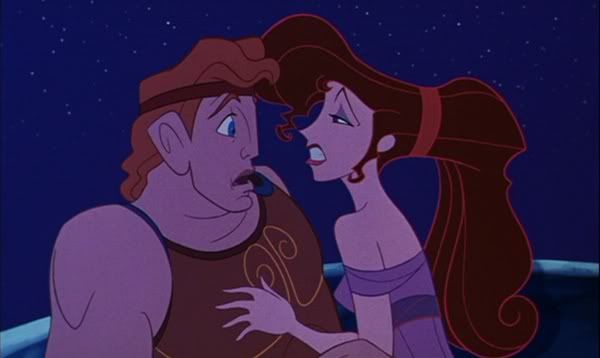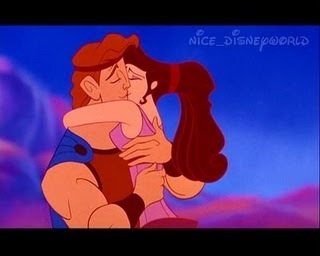The 1997 film Hercules is a very character-heavy film, populated largely by male characters who move the action forward. Meg, the love interest to the title character, fulfills the Disney requirement for a female lead to accompany the male lead, while the Muses provide the movie’s narration. However, other than these women, the story is largely dominated by male characters. Hercules is different from many of its animated predecessors in that the main character’s mother is neither dead nor inexplicably absent; in fact, Hercules has two: his biological mother, Hera, and his adoptive mother, Alcmene. Neither of these characters is particularly prominent—Hercules’ interaction with his adoptive parents is mainly shown through moments with his father, and Hercules speaks only to Zeus during his quest to become a hero, meeting Hera only once as an infant at the film’s beginning and once as an adult at the end of the film. The establishment of strong relationships with father figures while neglecting the mother-child relationship is a trend that Disney continues in the animated film, Mulan, which was released the following year.
The film also takes a unique artistic approach, with character and design decisions that differ noticeably from many of Disney’s earlier films. The female character designs tend to exist in extremes, with female characters who are either inhumanly thin or exaggeratedly fat. Although other female characters in the Disney canon have had odd issues with physical design, they are particularly prominent in Hercules. The Muses demonstrate these extremes best, as four of the five are impossibly thin, while the fifth is fat and, subsequently, makes up a lot of the comic relief. She cannot be taken seriously because of her weight, nor can she be seen as a desirable body type, so any mood-lightening moments become her responsibility. The fifth muse becomes an object of amusement, while the other muses are viewed as desirable. Meg, as the love interest, also falls into the impossibly-thin body type, because a Disney love interest cannot be seen as unattractive in any way. In order for the perfect romance to unfold, the love interest must be traditionally beautiful, and Meg’s tiny waist takes the societal obsession with thinness to the extreme.

As a character, however, Meg is the most fiercely independent of any Disney female lead before her, and she has a depth of character that many others lacked. Meg’s romantic history, for instance, is different in that she has a romantic history; she is not innocent and does not spend her days dreaming of true love like many of her predecessors. Meg’s previous relationship is specifically mentioned during the movie, as Hades reminds her of her obligations to him: “You sold your soul to me to save your boyfriend’s life. And how did that creep thank you? By running off with some babe. He hurt you real bad, didn’t he, Meg?” When Hercules first encounters Meg, she is not the helpless, naïve damsel of earlier Disney films. She has been hurt in love in the past, so she does not view Hercules as her hero or a possible love interest. She is wary of falling in love again, and she has decided that no one can be trusted, so she must look out for herself. Her aspirations are in no way adherent to traditional gender roles. Meg is not looking to find a man, get married, and live happily ever after. Her goals are to serve out her sentence, free herself, and look out for number one. Although she grows to like Hercules eventually, she is initially very cautious, and it takes her a long time to get to know him and open up to the idea of falling in love again.

When their relationship does begin to form, Meg again breaks gender norms by taking control of the relationship. Although she is willing to take a chance and explore a relationship with Hercules, she is not the sort of woman who is content to remain the passive partner. Meg is confident, experienced, and the aggressor of the relationship, taking charge despite Hercules’ role as the man and the literal hero. During their interactions and courtship, Meg is always the one to approach Hercules, and she is the one who flirts and makes any suggestive comments that are made between them. In one scene, she attempts to discover Hercules’ weakness (at Hade’s request) by crawling into his lap and attempting to seduce him, to which Hercules responds with panic and uncertainty. He is the sheltered and inexperienced partner, while Meg knows what she is doing and does not hesitate to take charge.

Part of Meg’s independent nature lies in her resourcefulness and her ability to take care of herself. Although Hercules does fulfill his role as the hero by going to the Underworld to restore her soul and save her life, this action is only necessary because Meg has sacrificed herself for him. During a battle with the Cyclops, Hercules is nearly crushed by a falling column, but Meg pushes him out of the way and is instead the one who is crushed beneath the pillar. Not only does Meg save his life, but she gives her own to do so, a heroic deed by the film’s own definition. This is an important event in the Disney canon. While earlier male Disney heroes take the sole responsibility of saving the love interests’ lives, Hercules saves Meg only after Meg sacrifices herself to save Hercules. This establishes their relationship as an equal partnership, in which neither is superior to the other, despite the traditional male/female power imbalance. When the movie ends with the couple’s kiss, it is clear that Meg has not come to this point out of the need or expectation of marriage. She enters into the relationship because it is something she wants to explore, despite her painful romantic past, and not because she has been pressured into it or because she dreams of a fairytale version of true love. Meg’s actions are governed by Meg herself, and never by what anyone expects of her. When the couple shares their climactic first kiss at the end of the movie, it is again Meg who is in control, a first for any Disney kiss.

No comments:
Post a Comment